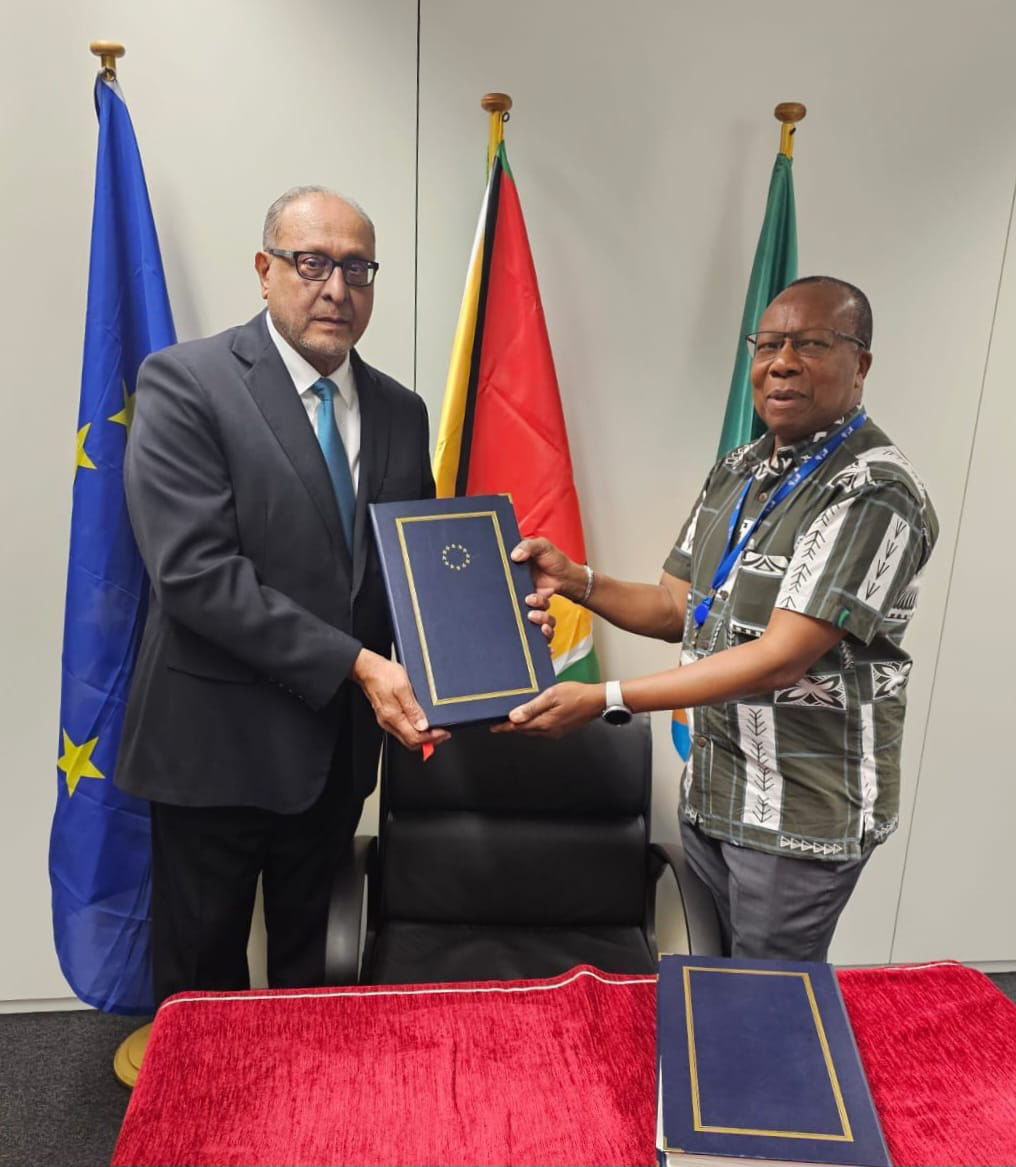The Ministry of Foreign Affairs and Inter-national Cooperation yesterday announced the signing of the Organisation of African, Caribbean, and Pacific States (OACPS) – European Union (EU) Partnership Agreement, known as the “Samoa Agreement” by the Government of Guyana.
This accord aims to bolster ties, promote sustainable development, and enhance cooperation between OACPS member states and the European Union.
Yesterday, Dr. Rajendra Singh, Guyana’s High Commissioner to the United Kingdom, signed the agreement on behalf of this country in a ceremony held at the OACPS Secretariat in Brussels, Belgium. The event was attended by high-level officials from the OACPS Secretariat and the European Commission.
A release from the ministry noted that this landmark agreement succeeds the Cotonou Partnership Agreement, signed in 2000, and will govern relations among the signatories for the next twenty years. Negotiations concluded in December 2020, and the agreement entered into force provisionally in January 2024. Guyana is a late signatory.
The 27 EU member states and the 79 African, Caribbean, and Pacific countries collectively represent around 2 billion people and more than half of the seats at the United Nations.
This new Agreement equips the Parties to better address emerging needs and global challenges, including climate change, inclusive and sustainable economic growth and development, migration, health, and peace and security, the release said.
On November 15, 2023, the EU and its member states signed the new partnership agreement in the Polynesian island country of Samoa. Guyana withheld signing on because of what it said were a number of concerns. One source had told this newspaper that Guyana was trying to get an “interpretative statement to show Guyana’s position” before signing.
A source had said that Guyana is not a signatory to the United Nations Convention Relating to the Status of Refugees, and it believes that a part of the Samoa Agreement has clauses which reference this. “We are not signatory to the UN convention on refugees. It has all sorts of obligations. Clause 76 speaks to the treatment of migrants… and that has been an argument,” that source had stated.
With around 30,000 to 40,000 Venezuelans having arrived here over the last seven to eight years, the government had concerns about a possible impact in this area.
“Article 13 of the Cotonou Agreement provides for dialogue and cooperation in the matters of both legal and illegal migration, including return and readmission, but does not clearly provide for enforcement and sanctions,” according to the European Parliament.
“Title VI of the future OACPS-EU agreement (Samoa) will go far beyond Cotonou in this matter. This title provides for a comprehensive, coherent, pragmatic and balanced approach, in full respect of international law, including international human rights law and, when applicable, international refugee law and international humanitarian law, but does not explicitly mention the UN Global Compacts on migration and on refugees,” a briefing from the EU Parliamentary Research Service (EPRS) stated.
“The parties commit to fair treatment and non-discrimination of legal migrants and ‘shall pursue efforts to adopt effective integration policies’ towards them (Article 64). The negotiated agreement mentions cooperation to reduce the transaction costs of remittances, the need to facilitate circular migration, and the ‘relevance’ of South-South migration, but is not very detailed in this regard. The Africa protocol, title VI, includes further commitments on facilitating legal migration and mobility, encouraging diaspora investment and remittances, and supporting intra-African cooperation on migration,” it added.
The Cotonou Agreement was due to expire on 29 February, 2020, but it was extended temporarily to no later than 31 October, 2023, pending adoption of a new agreement.
“… The Samoa Agreement is based on six key priorities: human rights, democracy and governance; peace and security; human and social development; inclusive, sustainable economic growth and development; environmental sustainability and climate change; and migration and mobility. The EU and the OACPS agreed on the principle of a common foundation complemented by three regional protocols for African, Caribbean, and Pacific OACPS members respectively,” it adds.







